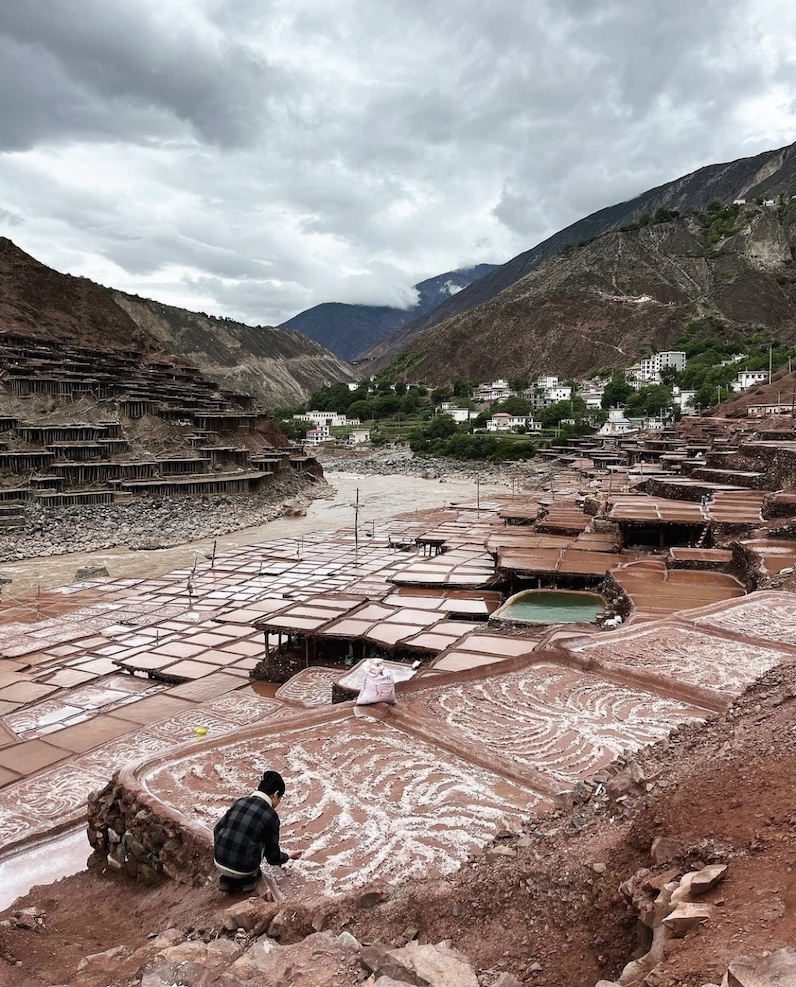Yeshi’s recent health scare (thank you all for your concern) has taught us about a medical condition that he had never heard of before, despite Tibet being one of the world’s hotspots for the disease.
Last month he discovered a lump in his neck. Thankfully the swelling turned out to be benign, but tests revealed that he has hypothyroidism, a condition in which the thyroid gland struggles to make enough hormones to meet the body’s needs (and these are plentiful: thyroid hormones aid tissue repair, regulate the metabolism, and promote growth and development. They also play a direct role in controlling our body temperature, heart rate and blood pressure).
The most common cause of thyroid disease is iodine deficiency, and it turns out that Tibet is one the most severely iodine-deficient parts of the world. Iodine is a trace mineral commonly found in a variety of foods that are not necessarily available on the Plateau.
In many places – including China, and so Tibet – iodine fortification is now a thing: it’s added to table salt, and hey presto – iodine intake is immediately where it needs to be.
But Yeshi’s family rarely buy in foodstuffs. Salt is widely available from the 1,300 year-old salt flats of Yanjing, just a couple of hours drive from his village, and also – it turns out – his father’s hometown. We visited these fields when we were in Tibet earlier this year. Our pictures and videos (above and below) show the scale of the operation (and this documentary makes for beautiful viewing if you’re up for a deep dive into the Tibetan salt manufacturing process).
No doubt delicious salt, and it’s rich in essential nutrients such as sodium, copper, zinc, magnesium – but it doesn’t contain iodine.
We now understand that Tibet’s eastern and southern regions – Yeshi’s hometown area – have the highest prevalence of thyroid disease inside Tibet. Growing up, Yeshi was likely iodine deficient. And it looks as if he’s not much better off here in the UK. Unlike other countries, Britain has not introduced a formal programme of iodine fortification such as salt iodisation.
In the UK, milk and dairy products are our principal source of iodine. This has been the case since farmers started adding iodine to cattle feed back in the 1930s. In the post-war years there was a big drive to get people to drink more milk (some of us may remember this…). But it’s likely that many of us are iodine deficient in 21st century Britain. Diets are changing, and iodine-rich foods such as dairy and fish are falling out of favour.
Yeshi is doing fine, and if the medicine does its job then in a few months’ time he should find himself with a lot more energy. Meanwhile we’ve got a great team working alongside us now, so if you see a little less of him at the restaurant you’ll know that he’s taking the R&R he needs and deserves.
We’re open all the usual hours this week, as follows:
Weds – Fri: 5-9.30pm (dinner only)
Saturday: 12-3 (lunch) / 5-9.30pm (dinner)
Sunday: 12-3 (lunch) / 5-9pm (dinner)
This week’s menu is up on the website – check it! Come by for take away, dine in or you can order home delivery through Deliveroo.
PSA! Chef Nyima has cooked up a special batch of sesame chicken this week for the many fans who’ve been disappointed by recent freezer stocks. Generally speaking our freezers are looking much fuller than they’ve been since the restaurant reopened after the summer. Come forage! We also have good stocks of chilli oil – pop in for yours or click here for online orders.
Looking forward to seeing you all soon!
Julie and Yeshi
Opening hours this week:
Weds – Fri: 5-9.30pm
Saturday: 12-3pm 🥢 5-9.30pm
Sunday: 12-3pm 🥢 5-9pm
☏ 01865 499318
Do you love the Taste Tibet cookbook? Please take a minute to leave us a review! 🙏🏽








